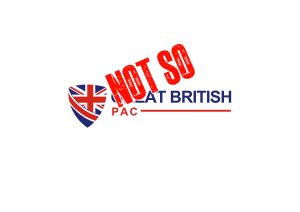
The Great British PAC has burst onto the political scene, promising to unite the right, counter Labour’s dominance, and reshape Britain by the 2029 election. Led by former Brexit Party MEP Ben Habib and backed by a coalition of conservative figures, this self-styled “activist campaigning group” draws inspiration from American Political Action Committees (PACs), wielding a mix of grassroots rhetoric, AI-driven voter engagement, and a bold policy platform. Yet, as a skeptic, I see the Great British PAC not as a patriotic saviour but as a troubling import that risks undermining democratic norms, amplifying division, and introducing unaccountable influence into Britain’s fragile political system. Below, I outline the dangers of this transatlantic experiment and why it warrants scrutiny.
The Great British PAC openly emulates the American PAC model, which pools funds to influence elections through donations, advocacy, and media campaigns. In the U.S., PACs and their deregulated counterparts, Super PACs, have become synonymous with big money in politics, fuelled by rulings like Citizens United v. FEC (2010), which unleashed unlimited corporate spending ^[1]^. This system often drowns out ordinary voters, prioritising wealthy donors and special interests. Transplanting this framework to the UK, where campaign finance is tightly regulated by the Electoral Commission, raises serious concerns.
British politics has long valued transparency, with strict caps on donations and spending to prevent cash-fueled dominance ^[2]^. The Great British PAC claims it will operate within these rules, with Habib insisting it’s merely a campaigning group that won’t field candidates ^[3]^. Yet, its ambition to raise “tens of millions of pounds” to support a “small c conservative” agenda suggests an attempt to exploit legal grey areas, potentially funnelling money into advocacy or candidate support indirectly. Such tactics could create a shadow funding system, lacking the accountability of party donations.
Moreover, the PAC’s adoption of American-style strategies—such as “lawfare” (legal challenges to oppose policies) and a “whistleblower depository” to expose opponents—introduces a confrontational approach alien to British political tradition. These methods risk turning policy debates into legal battles, eroding public trust in democratic institutions and prioritising spectacle over substance.
Despite its grassroots rhetoric, the Great British PAC is led by an elite coalition, including Habib, businessman Andrew Hunt, tech expert Mike Rouse, and the enigmatic Floss Knight, described as a “strategy extraordinaire” ^[3]^. The involvement of polarizing figures like Carl Benjamin (Sargon of Akkad) and rumoured ties to transatlantic conservatives, including Trump allies, suggest a top-down operation dressed in populist garb. Knight’s opaque background only deepens the mystery: without a public track record, it’s unclear whose interests she serves.
The PAC’s lack of transparency is alarming. Unlike political parties, which must disclose donors to the Electoral Commission, campaigning groups face less scrutiny ^[2]^. The Great British PAC’s plan to raise millions begs the question: from whom? Without clear reporting, wealthy individuals or opaque entities could bankroll its agenda, buying influence over its policy platform and candidate endorsements. Its transatlantic rhetoric—praising Trump’s policies and aligning with the “Free Muskosphere” free speech initiative—hints at external influences that clash with British sovereignty ^[3]^.
The PAC’s mission to “unite the right” by bridging the Conservatives, Reform UK, and others is equally fraught. Its hardline focus on immigration, energy security, and an “Ultimate Repeal Act” to dismantle Labour’s policies risks alienating moderate voters and deepening divisions within the right ^[3]^. The PAC’s AI-driven app, which crowdsources policy ideas, could amplify extreme proposals, creating a feedback loop that radicalises its base ^[4]^. In a climate already strained by misinformation, such tools threaten to exacerbate polarisation rather than foster dialogue.
The Great British PAC’s structure bypasses traditional party accountability, such as manifestos and internal elections. Its vow to “hold politicians to account” sounds noble but could translate into bullying candidates with threats of withheld funding or media attacks, mirroring U.S. Super PACs that flood primaries with cash to sway outcomes ^[1]^. Its “media rebuttal” unit risks becoming a propaganda machine, prioritising spin over truth and degrading political discourse into mudslinging.
The PAC’s long-term vision—a “post-socialist Britain” achieved through legal challenges and sweeping policy reversals—rejects the compromise inherent to parliamentary democracy ^[3]^. Its “Ultimate Repeal Act” implies a power grab, aiming to dismantle Labour’s legacy wholesale rather than engaging in incremental governance. This absolutist approach could destabilise institutions, alienating voters who value stability.
The Great British PAC markets itself as a patriotic bulwark against Labour’s overreach, but its American-inspired model, opaque leadership, and polarising tactics reveal a troubling agenda. By importing the PAC framework, it risks flooding British politics with unaccountable money and foreign-influenced ideas, undermining the transparency that defines our system. Its elite-driven structure belies its grassroots claims, and its push to “unite the right” could fracture it further, handing Labour an advantage. Most alarmingly, its confrontational methods threaten to erode democratic norms, replacing debate with division.
As skeptics, we must demand answers: Who funds the Great British PAC? Whose interests does it serve? And what happens when its millions reshape our politics in ways voters never intended? British democracy deserves better than a transatlantic experiment that prioritises power over principle. Voters and regulators must scrutinise this group closely, ensuring it adheres to the transparency and accountability that safeguard our system.
References
[^1]: Brennan Center for Justice: Citizens United Explained
[^2]: Electoral Commission: Donations and Loans
[^3]: Conservative Post: A New Force to Be Reckoned With – The Great British PAC Charges onto the Political Scene
[^4]: The Guardian: AI-driven Political Campaigns Risks Democracy
If you tolerate this, then your children will be next…
Huge thanks to YConX for bringing this to our attention on our Space – 16/04/2025
© The Uncensored Patriots - 2025. All rights reserved. Web design and maintenance by Consiliuma. Articles by TUP Community Members.